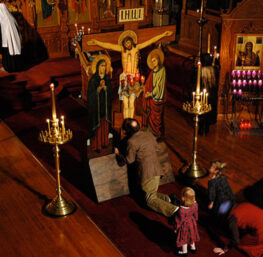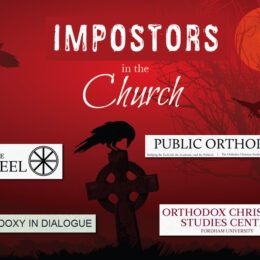BreakPoint | Rev. Robert Lynn | Mar 27, 2009
Our life together in Christ isn’t simply about deciding what we’re against, what we won’t do and what we won’t allow. It’s also about deciding what we’re for.
Please don’t misunderstand. The Bible is against many things. Why? Because God created men and women in his image to live with Him and one another in a way that gives rise to human flourishing. God isn’t against things simply to prove He’s big enough to make rules and powerful enough to enforce them. He’s against the things that undermine or destroy the well-being of those who bear His image. As someone once said, if you live against the grain of the universe, you’re sure to get splinters. The Ten Commandments, for example, teach us how to live with the grain of the universe so that we might experience the fullness of what it means to be truly human. God is against certain things because He is for other things.
I fear that in America, the evangelical church is largely known for what it is against. Its image in the culture is one that seems negative and angry. The result is that the culture seems to be quite clear about what we’re against but seems to have little understanding of what we are for. Is it the case that we have failed to adequately explain the Gospel to our culture—to define and explain what it means to live positively in God’s world? And so a question I put to myself and to you, to my church and your church: Do those around us see us and see our churches as merely being against something or do they also see us as being for something?
Perhaps two examples will better help explain what I’m trying to say. The first example is the story we find in the book of Ruth. The context of Ruth’s story is the time of the judges. Recall Judges 21:25, “In those days there was no king in Israel; everyone did as he saw fit.” It was a time of moral and spiritual chaos. But in the midst of this chaos, we turn to the book of Ruth to see three lives in Bethlehem. We tend to misread Ruth as the romantic story of a young widow and a lonely bachelor who find love, get married and live happily ever after. Sure, they have a baby who is an ancestor of Jesus. But we still read it as a story of love and romance.
However, we need to read the book of Ruth with new eyes. Naomi, Ruth and Boaz loved the living God and so would have loved what He loves and hated what He hates. Undoubtedly they were against the moral and spiritual chaos of Israel in all its forms. But notice that the book is not about what they were against; it is about what they were for. Look carefully at the story some time soon. As we look at the life of Bethlehem through the lens of these three lives, what do we see? We see Bethlehem as a place where the poor are fed, children are wanted, the elderly are cared for, family is valued, the weak and the vulnerable are protected, justice is prized and relationships are marked by loyalty, love and integrity. In other words, we see a group of people who together are a community of human flourishing. They embody God’s shalom, bearing witness to the possibility of human wholeness in the middle of an ocean of human brokenness. We have to infer from the book what they are against, but we know with absolute clarity what they are for. They give us a glimpse of what it means to live positively in God’s world.
Let’s look at another example, the early church in the context of the Roman Empire. There was a lot to be against in the Roman Empire—slavery, the violence and brutality of the games, infanticide, abortion, homosexuality, women treated as semi-property, the abuse of Roman imperial power to crush dissent and oppress minorities. And early church leaders did speak out about what they were against. For example, The Didache, an early manual of Christian teaching speaks against abortion and infanticide. Justin Martyr in his First Apology condemns infanticide. Tertullian wrote about the cruelty of the games in his treatise De Spectaculis.
But the early church wasn’t simply against sin and evil, cruelty and violence. It was also for the pursuit of virtue and goodness. Sociologist Rodney Stark’s remarkable work, The Rise of Christianity, is animated by a central question, “How did the obscure, marginal Jesus movement from the edge of the Roman Empire dislodge classical paganism and become the dominant faith in the Western world in a few centuries?” If I were to summarize his answer, I would put it this way. Christianity became the dominant faith because it pursued goodness. It gave a civilization a new idea of humanity in a world saturated by cruelty, violence and the abuse of power. It provided an example in Christian community of what true human flourishing looked like.
Cyprian, Bishop of Carthage in the second century, insisted that the task of the Christian was to overcome evil with good and this good was to be done to all men, not just to fellow believers. Notice Cyprian doesn’t simply say our task is to overcome evil by opposing it and being against it. We are to overcome evil by the pursuit of that which is good. Stark notes that as Christian truths and teaching were acted out in daily life by the early Christians, the Church was able to transform human experience and relieve human misery.
[…]
Unlike those early Christians who entered deeply into their world to give the gift of being human, today we often create the escapist, separatist religious ghetto of what Ken Meyers calls a Christian look-alike culture. However, since it’s a look-alike ghetto, it shares the assumptions of modernity and postmodernity, just lightly dusted with badly done proof-texting. A therapeutic gospel, the centrality of self, the primacy of pop culture, the blandishments of modern marketing, the commitment to technique, to name a few examples, all find their way into the heart of church life. The tragic irony, of course, is that in the name of avoiding worldliness we bring the world right in the front door of the church with the same dehumanizing results. Simply being against worldliness has not served us very well.
The sins of modern culture that thwart and undermine human flourishing are real. All around us are the shapes and patterns of personal and cultural brokenness. Whatever they are, we should be against them. But the Christian story calls us to something more: the pursuit of goodness. Listen to the apostle Paul when he says in Philippians 4:8:
Finally, brothers, whatever is true, whatever is noble, whatever is right, whatever is pure, whatever is lovely, whatever is admirable—if anything is excellent or praiseworthy—think about such things.
[…]
C.S. Lewis reminds us in his small but potent volume, The Abolition of Man, that at the center of Christian existence is the heart shaped by rightly ordered loves. We are not simply against lies, we are for truth; we are not simply against evil, we are for goodness; we are not simply against ugliness, we are for beauty. And why? Because we love and worship One who is True, Good, and Beautiful. And this One who is True and Good and Beautiful is the Triune God who calls us to be for the world because He is for the world. God so loved the world—is so for the world—that He gave his only Son that through Him the world might be save—not reluctantly and by the ‘skin of its teeth’ but by a vast, unmeasured, boundless, and free love that makes all things new.
. . . more


